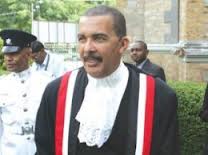(Trinidad Express) Justice Anthony Thomas Aquinas Carmona will be elected the fifth President of Trinidad and Tobago on February 15.
Prime Minister Kamla Persad-Bissessar yesterday hailed Carmona as a “distinguished son of the soil”, naming him as the Government’s nominee to succeed President George Maxwell Richards.
The President is elected by the Electoral College which is comprised of the members of the House of Representatives and the Senate.

Carmona’s rise to the presidency is ensured with the People’s Partnership’s majority in Parliament.
The Prime Minister made the announcement at the Diplomatic Centre, St Ann’s, around 6 p.m. yesterday.
Persad-Bissessar emphasised that there was great consultation and deliberation on the country’s new President.
The Prime Minister earlier met with Opposition Leader Dr Keith Rowley and his team who proposed Caribbean Court of Justice (CCJ) Judge Rolston Nelson for President.
The Prime Minister then met with Government members, including leaders of the People’s Partnership coalition and parliamentarians, who all had the opportunity to express their view on the choice for President.
“Fellow citizens, I have the honour and immense pride to have advised his excellency Prof George Maxwell Richards to advise the honorable Chief Justice Mr Ivor Archie and to advise the honourable Leader of the Opposition Dr Keith Rowley that the Government of Trinidad and Tobago formerly proposes the name of Mr Justice Anthony Thomas Aquinas Carmona, Senior Counsel, as the nominee for the post of President of the Republic of Trinidad and Tobago,” said Persad-Bissessar.
A loud round of applause followed from Government members present.
Persad-Bissessar said Carmona was an internationally respected member of the Judiciary, having recently been elected as a judge of the International Criminal Court—which is internationally recognised as having been formed out of a proposal put forward by former T&T prime minister and president Arthur NR Robinson.
Carmona, she said, has a distinguished career in the criminal justice system over the past 30 years, having served under several administrations.
Persad-Bissessar noted that Carmona held the positions of deputy Director of Public Prosecutions and acting Director of Public Prosecutions and was also the United Nations prosecutor at the international criminal tribunal for the former Yugoslavia.
She added that Carmona has also been a senior tutor in the department of government and a lecturer in Languages and Linguistics at The University of the West Indies.
“Mr Justice Anthony Carmona, in the opinion of those giving consideration, has demonstrated the qualities of human character, experience and distinguished qualifications worthy enough to be the nominee for President of the Republic of Trinidad and Tobago and to best serve our citizens their enshrined and sacred democratic rights and interests with compassion, humanity, fairness and love towards all,” said Persad-Bissessar.
On March 17, the second term of President Richards will expire. He has served as President for the past decade.
The Prime Minister expressed deep gratitude to Richards on behalf of the people for his service.
“As an academic and former principal of the University of the West Indies, his excellency brought to this esteemed office scholastic expertise and he is best remembered as the person who redefined the role into a more people-friendly one,” said Persad-Bissessar.
“His excellency President George Maxwell Richards has served us with honour and dignity, and he will hold, like all presidents past, a sacred and special place in our nation’s history,” she added.
Since the announcement was made last month that a new President was to be elected, the country was gripped by intense speculation as to who would be chosen.
Names such as House Speaker Wade Mark, Justice Amrika Tiwary-Reddy and Independent Senator Subhas Ramkhelawan, among others, were all in the race.
“I am proud to say that from the bosom of our citizenry there were many sound candidates recommended, each in his or her own right eminently qualified for the post,” said Persad-Bissessar, adding that she took into consideration the suggestions from all.
She noted that this country’s first President, the late Sir Ellis Clarke, swore on August 1, 1976 to uphold the Constitution in good faith with bias to none and showed that citizens were capable of governing ourselves in peace, harmony and progress.
Some 36 years later, Persad-Bissessar said this country has impressed the world with literary, cultural, scientific, business and technological advancements and developments.
In addition, she said, in the age of civil wars and terrorism, “we stand as a global beacon of hope and example of how one small group of people so diverse in religions, ethnicities and cultures, can unite as one people under the banner of progress, discipline, tolerance, production and most importantly, peace”.
“That is the significance of the Office of President to us as a people and in our ever-changing world, where the evolution of human rights have now, justly, gained precedence, we must remember that the role of President of Trinidad and Tobago has thus become, more than ever, an important one constitutionally and it is much needed to effect proper governance and the democratic tenets which bind us,” said Persad-Bissessar.
The Prime Minister noted that far from being a mere ceremonial post, the office and role of the President “is in fact the measure of democracy in our nation, the guidepost of our humanity, wisdom, civility, rationality, compassion, intelligence and progress as we uphold and respect our democratic principles of equality for all”.








